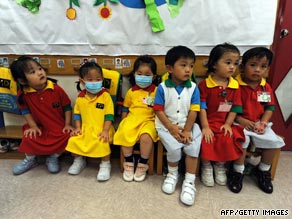
The World Health Organization scheduled an emergency meeting for Thursday to decide whether to declare a global swine flu pandemic as confirmed cases of H1N1 virus continue to soar worldwide.
By early Thursday morning, the U.N. health agency had recorded more than 27,700 cases in 74 countries, with 141 deaths. Also Thursday, authorities in Hong Kong ordered the closure of all elementary schools, kindergartens and day-care centers in the city after 12 students were found to be infected with the virus. Authorities have not determined the source of the infection, said Hong Kong’s Chief Executive Donald Tsang. This makes it the first cluster of swine flu cases in the city without a link to someone who had traveled overseas. The number of cases continue to grow in Britain, Japan and Australia — all of them outside the Americas where the virus was first detected in April. If the WHO declares a pandemic Thursday, it will be the first flu pandemic in 41 years. “We know that the virus is spreading and we are now seeing that activity is picking up in a number of countries and this is, as I had mentioned before last week, we know that we are getting closer to probably a pandemic situation,” Keiji Fukuda, the agency’s assistant director-general of health security and environment, told reporters Tuesday.
Don’t Miss
Time: H1N1: Is this a pandemic or isn’t it
Scientists dig for lessons from past pandemics
WHO considers move to pandemic phase 6
Candidate virus for H1N1 vaccine arrives at CDC
The Geneva-based United Nations health agency is working to prepare governments first to prevent an overreaction if WHO’s six-step pandemic scale is raised to its highest level, he said. “What this would mean is that spread of the virus has continued and that activity has become established in at least two regions of the world,” he said. “It does not mean that the severity of the situation has increased and that people are getting seriously sick at higher numbers or higher rates than they are right now. This is a very important point for countries to understand.” The schools and day-care centers in Hong Kong were told to close for 14 days as investigators tried to identify the source of the infection, said Tsang, the chief executive. The health department will decide after two weeks whether or not to continue the shut-down. A month ago, Hong Kong quarantined about 300 hotel guests for a week after the first case of the virus was confirmed there. Hong Kong’s abundance of caution stems from the government’s unwillingness to see a repeat of the SARS epidemic in 2004 that killed nearly 300 people. Also on Thursday, Israel’s health ministry announced that the number of people diagnosed with swine flu was 68. Health officials have begun using the virus’ clinical name — H1N1 — to reflect that it’s actually a combination of several different types of flu and to reduce confusion about whether eating pork can spread the virus. It cannot.